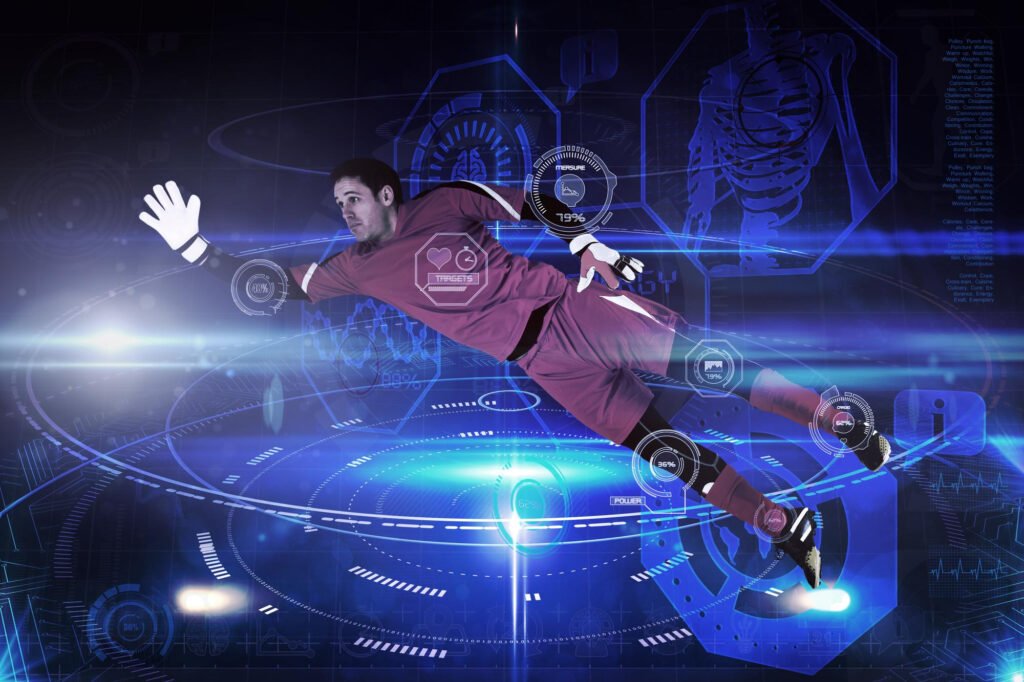Artificial Intelligence (AI) is rapidly transforming industries worldwide, and the sports sector is no exception. From enhancing athlete performance to revolutionizing fan engagement, AI is making significant strides in how sports are played, managed, and experienced. In 2025, the integration of AI in the sports industry is more pronounced than ever, promising to reshape the future of sports in unprecedented ways.

Enhancing Athlete Performance
One of the most impactful applications of AI in sports is improving athlete performance. AI-driven analytics tools can now analyze vast amounts of data collected from wearable devices, cameras, and other sensors. These tools provide coaches and athletes with detailed insights into performance metrics such as speed, agility, and endurance.
For example, football clubs like Manchester City and FC Barcelona use AI to track player movements during training and matches. This data is then analyzed to identify patterns, strengths, and areas for improvement. AI algorithms can also predict the risk of injuries by analyzing an athlete’s biomechanics and workload, enabling preemptive measures to prevent injuries.
Revolutionizing Game Strategy
AI is also transforming how teams develop and implement game strategies. Advanced AI systems can analyze an opponent’s past performances, tactics, and player behavior to devise optimal game plans. These insights help coaches make data-driven decisions during matches, increasing the chances of success.
Basketball teams like the Golden State Warriors are leveraging AI to analyze game footage and opponent strategies. This analysis helps identify weaknesses and develop counter-strategies, providing a competitive edge on the court. AI also simulates various game scenarios, allowing teams to prepare for different possible outcomes.
Enhancing Fan Engagement
Fan engagement is a critical aspect of the sports industry, and AI is pivotal in enhancing the fan experience. AI-powered chatbots and virtual assistants are commonplace on sports websites and mobile apps, providing fans with real-time information, personalized content, and interactive experiences.
For instance, NBA teams use AI to deliver personalized content to fans based on their preferences and past interactions. AI algorithms analyze fan behavior and tailor content, such as highlight reels, player interviews, and game statistics, to individual tastes. This level of personalization enhances fan loyalty and engagement.
Improving Sports Broadcasting
AI is revolutionizing sports broadcasting by automating and enhancing various aspects of production. AI-driven cameras and software can automatically capture and highlight key moments in a game, reducing the need for extensive human intervention. This technology ensures that fans never miss a crucial play, whether they are watching live or on-demand.
Companies like IBM and Intel are at the forefront of integrating AI into sports broadcasting. AI-powered systems can analyze game footage in real time, providing instant replays, slow-motion analysis, and augmented reality (AR) features. These enhancements make the viewing experience more immersive and engaging for fans.
Advancing Sports Analytics
Sports analytics has come a long way with the advent of AI. Teams and organizations can now analyze data more comprehensively and accurately, leading to better decision-making and improved performance. AI algorithms can process large datasets quickly, providing previously unattainable insights.
Baseball teams like the Boston Red Sox use AI to analyze player statistics and performance metrics. This data-driven approach helps scout new talent, make strategic decisions, and optimize player lineups. AI’s ability to analyze complex data sets transforms how sports analytics are conducted, leading to more informed and effective strategies.
Enhancing Training and Rehabilitation
AI is also making significant contributions to athlete training and rehabilitation. AI-powered systems can create personalized training programs based on an athlete’s unique needs and goals. Based on performance data, these programs can be adjusted in real-time, ensuring optimal training efficiency.
In rehabilitation, AI-driven tools are helping injured athletes recover more quickly and effectively. AI can analyze an athlete’s movement patterns and provide tailored rehabilitation exercises. These tools can also monitor progress and adjust the rehabilitation plan, leading to better outcomes.
Conclusion
Integrating AI in the sports industry transforms how sports are played, managed, and experienced. From enhancing athlete performance and revolutionizing game strategies to improving fan engagement and advancing sports analytics, AI is profoundly impacting every aspect of the sports world.
As technology continues to evolve, AI’s role in sports will only grow, promising even more innovative and efficient solutions. Thanks to AI’s transformative power, the future of sports looks brighter and more exciting than ever for athletes, teams, and fans alike.